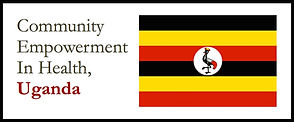
PROGRAMS IN UGANDA

Uganda Program Components
The program is based in the Mukono district of Eastern Uganda. Training for volunteers occurs principally on site, but also through a large amount of training materials supplied beforehand. A variant of the Ugandan-generated Village Health Team Manual serves as the basis for training, and US instructors cover all areas within, including malaria, maternal-child issues, sanitation, clean drinking water, etc. As of 2023, Omni Med has sent over 200 volunteers to Uganda to train upwards of 1350 community health workers (VHTs). See more here.
Our work in Uganda is all done by staff, volunteers and VHTs. It all works together, but is best viewed through individual projects clarifed below and on the following pages.
1
Village Health Team Member Training
Omni Med has trained 1350 VHTs thus far, each during a week- long, highly structured training program. Most training is done by local MOH health personnel, with some done by our visiting volunteers. VHTs, locally elected by their villagers, then provide preventive & curative care, refer sick villagers to health centers, and collect data for the Ministry.

2
The Dr Deo Sekimpi Project
This project was named after Dr Sekimpi, a friend of Omni Med and one of Uganda's VHT program founders. This program is designed to maintain the VHTs once they have been trained. It consiststs of five components: home visits, quarterly meetings, local VHT leadership via elections, volunteering in local health centers, and VHT gatherings together.

3
Protected Water Sources
The region in which Omni Med trains and manages VHTs is marked by poor access to water. For many in this region, water is too scarce, too contaminated, or too expensive to appropriately or safely meet basic needs. Omni Med has constructed 34 protected water sources now bringing potable drinking water to over 8000 people. The objective is to train highly effective VHTs using our donated funding and the expertise of Mukadde John Lubanga and Mwebe Edward Mutimba to empower communities to construct a protected water source (PWS) for their own permanent, free use. This provision is given as a reward for the effective and impactful work performed by VHTs in those communities.

4
Insecticide Treated Net Installation
In 2009, TAMTAM (Together Against Malaria), an NGO based at MIT, partnered with Omni Med to distribute insecticide treated nets (ITNs) in Ntenjeru, Mukono District. In 2015, Omni Med received a three year grant from The American Academy of Pediatrics to distribute and track ITNs throughout Mukono District. That program complements government ITN distribution efforts throughout the District.

5
Cookstove Construction
Omni Med has partnered with The Cookstove Project in order to construct clay cookstoves for homes which significantly reduce harmful smoke inhalation. Most of the population uses open fires inside houses to cook food which results in smoke filling homes and the community, adversely affecting almost 4 million households in Uganda. The cookstove project reduces pneumonia rates by constructing a contained cooking chamber for efficient fuel combustion, made out of all locally available and free materials: termit mound clay, banana plant components, dried grass and water. Along with our colleagues in the Cookstove Project, we monitor, build, and track the cookstoves built in the Mukono District to improving life for local villagers.

6
Technology eLearning
James O'Donovan has partnered with Omni Med to pioneer a program using virtual programs loaded onto Android tablets to train VHTs. In 2016, we conducted a study comparing VHT knowledge from this program vs standard didactic training.(Please see the publication in the research section.) We are expanding the scope of the training to cover all of the Ministry of Health's ICCM training modules. One can readily envision the potential of introducing tablets to rural area for ongoing education, data collection, communication of infectious disease outbreaks, and referral of sick villagers. This has great potential and should be scalable well beyond Mukono and Uganda.
